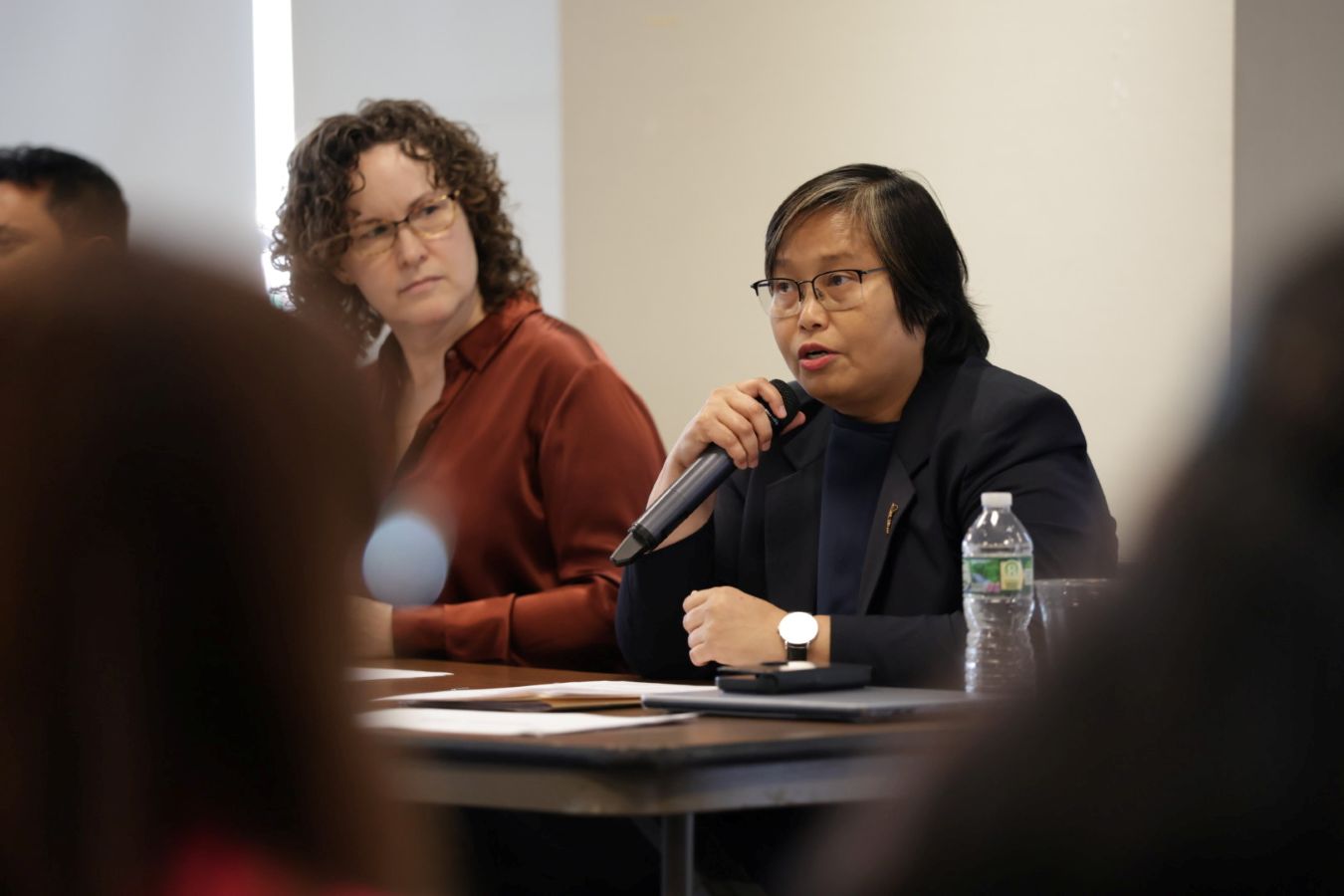When the UN General Assembly opens each September, all UN member states are invited to address the world body. For the past three years, this has not been true for Myanmar. Following the February 2021 military coup, no statement has been delivered on behalf of Myanmar because national leadership remains contested between the military and the people’s movement that opposes the military’s takeover. Each side claims to represent the people of Myanmar.
On October 2, QUNO co-hosted a panel event with representatives of Myanmar’s opposition movement. Under the title, Building the New Myanmar: Democracy, Justice, and Peace for the People of Myanmar, the panel presentation provided an opportunity for UN diplomats, UN staff, and civil society partners to hear directly from representatives of Myanmar’s National Unity Government (NUG) and its National Unity Consultative Council (NUCC). Moderated by QUNO Director Sarah Clarke, the panel included Zin Mar Aung, Foreign Minister; Aung Kyaw Moe, Deputy Minister for Human Rights for the NUG; plus Z Nang Raw, a civil society representative to the NUCC.
Speaking to a crowd of over 50 guests, Sarah introduced the panel, noting, “The diversity of this panel reflects the diversity of Myanmar itself. Myanmar’s diversity is one of the most beautiful aspects of the country, and it has long been manipulated and used as a driver of conflict. But as we can see from our panel today, unity across diversity, cooperation, and collaboration will ultimately pave the way to a peaceful Myanmar”.
The speakers went on to outline their vision for a future Myanmar. They called on the international community to take the concrete steps needed to stop the mass violence and human rights violations being carried out by the military against the people of Myanmar.
Panelists focused their remarks on elections, which the military has scheduled for the end of December. The Foreign Minister, Zin Mar Aung, explained that the military was motivated to hold elections to achieve legitimacy and recognition:
“The military junta is looking for a way out for themselves, not the way out for the people or our country. After this coup, they desperately need recognition and legitimacy. But the scam election proposed by the military junta is not a solution. Most political parties have been banned from participating, criticism has been criminalized, most ethnic groups [in the borderlands] will not be able to vote, and many even within the [central] Burma region will not be able to vote. The outcome will not represent the will of the people. It is a trap used by the military junta to gain legitimacy.”
The panel presentation took place following the UN’s High-Level Conference on Rohingya Muslims and Other Minorities, which was held at the UN on September 30. The panelists articulated a vision of Myanmar based on the inclusion of all, regardless of their ethnic identity. Aung Kyaw Moe, the Deputy Minister of Human Rights and a member of the Rohingya community, noted that his appointment as Deputy Minister for Human Rights represented a concrete step towards this reality. He said, “In building the new inclusive federal democracy, everyone’s equal participation is important; everyone’s equal contribution is important. It is not about asking for rights alone. It is also about fulfilling obligations to the nation, including for the Rohingya”. He concluded by highlighting the NUG’s Rohingya policy and its commitment to repeal the discriminatory 1982 citizenship law.
Z Nang Raw further developed this vision of an inclusive future for Myanmar. Speaking from the perspective of an ethnic Kachin community leader, she noted the key role that Myanmar civil society organizations, especially women’s organizations, have played. Nang Raw highlighted the deadly challenges that women’s organizations have had to endure inside Myanmar while continuing to provide humanitarian aid and leading new forms of local governance in areas outside of military control.
The panelists shared a summary document, providing a synopsis of the current context and outlining concrete recommendations. The document can be accessed below.
While QUNO’s work on Myanmar usually takes place through smaller, off-the-record meetings at Quaker House, this public event was planned to build on the attention coming out of the opening of the UN General Assembly and the UN’s High-Level Rohingya Conference. Over the coming months, QUNO staff will continue to facilitate opportunities for UN partners to take part in private briefings and discussions regarding the situation on the ground. These opportunities for information sharing and dialogue are crucial as the international community seeks out ways to support a peaceful outcome.
Photo Credit: Kyaw Soe Latt







